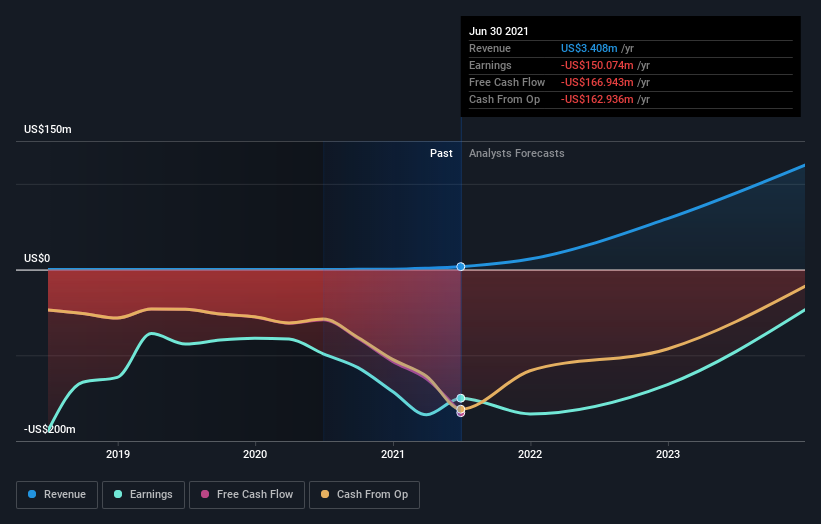Evofem Biosciences (NASDAQ:EVFM) shareholders have endured a 78% loss from investing in the stock three years ago
Every investor on earth makes bad calls sometimes. But you want to avoid the really big losses like the plague. So consider, for a moment, the misfortune of Evofem Biosciences, Inc. (NASDAQ:EVFM) investors who have held the stock for three years as it declined a whopping 78%. That would be a disturbing experience. The more recent news is of little comfort, with the share price down 75% in a year.
Since shareholders are down over the longer term, lets look at the underlying fundamentals over the that time and see if they've been consistent with returns.
Check out our latest analysis for Evofem Biosciences
Because Evofem Biosciences made a loss in the last twelve months, we think the market is probably more focussed on revenue and revenue growth, at least for now. Shareholders of unprofitable companies usually expect strong revenue growth. Some companies are willing to postpone profitability to grow revenue faster, but in that case one does expect good top-line growth.
Over three years, Evofem Biosciences grew revenue at 155% per year. That is faster than most pre-profit companies. So why has the share priced crashed 21% per year, in the same time? The share price makes us wonder if there is an issue with profitability. Ultimately, revenue growth doesn't amount to much if the business can't scale well. Unless the balance sheet is strong, the company might have to raise capital.
The image below shows how earnings and revenue have tracked over time (if you click on the image you can see greater detail).
It's probably worth noting we've seen significant insider buying in the last quarter, which we consider a positive. On the other hand, we think the revenue and earnings trends are much more meaningful measures of the business. If you are thinking of buying or selling Evofem Biosciences stock, you should check out this free report showing analyst profit forecasts.
A Different Perspective
The last twelve months weren't great for Evofem Biosciences shares, which cost holders 75%, while the market was up about 29%. Of course the long term matters more than the short term, and even great stocks will sometimes have a poor year. Shareholders have lost 21% per year over the last three years, so the share price drop has become steeper, over the last year; a potential symptom of as yet unsolved challenges. We would be wary of buying into a company with unsolved problems, although some investors will buy into struggling stocks if they believe the price is sufficiently attractive. It's always interesting to track share price performance over the longer term. But to understand Evofem Biosciences better, we need to consider many other factors. To that end, you should learn about the 5 warning signs we've spotted with Evofem Biosciences (including 2 which are a bit unpleasant) .
There are plenty of other companies that have insiders buying up shares. You probably do not want to miss this free list of growing companies that insiders are buying.
Please note, the market returns quoted in this article reflect the market weighted average returns of stocks that currently trade on US exchanges.
This article by Simply Wall St is general in nature. We provide commentary based on historical data and analyst forecasts only using an unbiased methodology and our articles are not intended to be financial advice. It does not constitute a recommendation to buy or sell any stock, and does not take account of your objectives, or your financial situation. We aim to bring you long-term focused analysis driven by fundamental data. Note that our analysis may not factor in the latest price-sensitive company announcements or qualitative material. Simply Wall St has no position in any stocks mentioned.
Have feedback on this article? Concerned about the content? Get in touch with us directly. Alternatively, email editorial-team (at) simplywallst.com.

 Yahoo Finance
Yahoo Finance 
